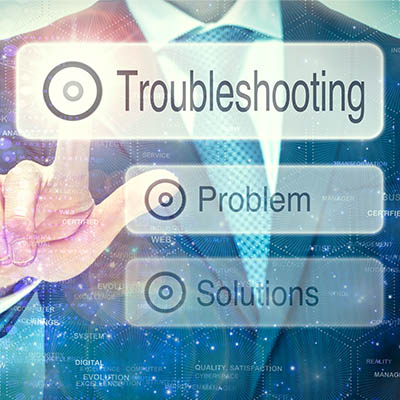It’s important to know what is in the food we eat, and in much the same way, it is also important that we know about the technology we use on a daily basis. A recent initiative is striving to place labels similar to those found for nutrition on Internet of Things devices to help consumers make better choices about their technology acquisitions.
When you suffer from a technical difficulty, it’s your responsibility to ensure that it is handled in a timely fashion, whether it is reporting the issue to IT or taking care of it yourself. The process of troubleshooting, however, can save you from waiting around while IT tinkers with your device’s settings. Let’s examine the five stages of troubleshooting and how you might try them yourself.
When you get excited to implement a new technology solution for your business, it is easy to let the expectation blind you as to the true value you get from it right out of the box. It’s no fault of your own; it’s human to have expectations that exceed reality. In business, though, it is important that you keep these misconceptions in mind, especially when it comes to your technology systems and implementing them.
Many businesses simply do not have the resources or budget to hire technicians to perform regular maintenance on their systems, let alone someone who is managing the technicians behind the scenes. The chief information officer, or CIO, is the one who would normally make these calls, but businesses that cannot hire an in-house CIO for whatever reason have the option of hiring a virtual CIO.
There are generally two approaches to technology maintenance. One of them addresses issues as they appear, and the other involves addressing possible issues before they become operational problems. How does your business go about technology maintenance? If it’s the first, also known as “break-fix” IT, then you are going about things the wrong way and leaving a ton of savings on the table.
No one likes to imagine the worst-case scenario, but as a responsible business owner, you have no choice but to see the bad before the good. After all, the investments that you make in the future of your organization mean nothing if you have no power to preserve it in the event of unfortunate circumstances. Due to the nature of technology, it is an ideal place to start thinking about preventative and proactive measures to keep your future secure.
Upgrading technology can often come with risk. While you might get some return on your investment, will you get it back fast enough to actually make that investment worth it in the end? How can your technology solve problems that your company experiences, and how do you acquire the capital necessary to make significant upgrades? If you dig too deep into the details, you might find that it is difficult to move forward with these major decisions, preventing you from leveraging these amazing benefits. Here are four signs that will give you an idea that it’s time to upgrade your technology.
Technology is one of those parts of your operational infrastructure that plays a massive role, even if you don’t realize it. In fact, you’ve been using all of the standard fare for business technology, such as computers, server units, and networking components for quite some time. All technology must eventually be replaced though, so it’s critical that your company has an established approach to make this happen in the most seamless and least stressful way possible.
The people who make use of your products or services, be they clients or customers, are the ones who keep your business afloat. Therefore, you must do your part to ensure that they are happy and satisfied with your business. Thankfully, the right technology can make doing such a thing much easier. Let’s explore some of the opportunities your business has to improve the customer experience through the use of innovative IT solutions.
All businesses utilize software to a certain extent, but not all companies have the same needs. That being said, there are certain types of software that all businesses can benefit from, regardless of industry or service offerings. We’ve put together a list of business software solutions that companies can utilize to improve operations.










